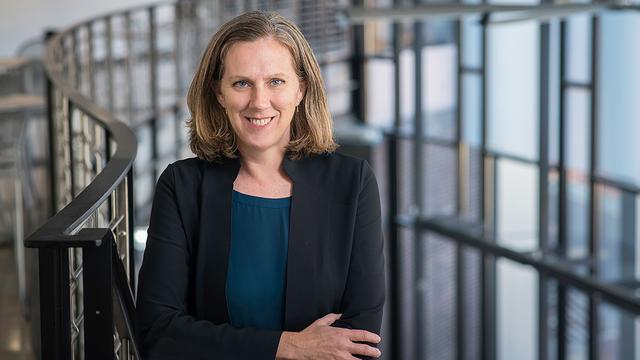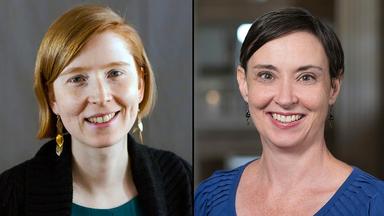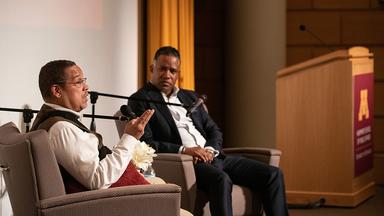Renowned human rights leader Janet Walsh will join the Humphrey School of Public Affairs this July as a senior fellow, working in the Master of Human Rights program. Walsh comes to the Humphrey School from Human Rights Watch (HRW), an international non-governmental organization that conducts research and advocacy on human rights issues.
Walsh was the organization's deputy director of the Women's Rights Division for the past 17 years, working on a range of women’s rights issues, including property and inheritance rights, reproductive rights, labor rights, violence against women, and work-family policies.
We asked Walsh about her move to the Humphrey School, and what drew her to dedicate her career to advancing human rights.
1. What excites you about joining the Humphrey School?
What excites me most is the opportunity to prepare students to thrive in human rights careers. The world needs creative, strategic, and visionary human rights advocates, and the Humphrey School is uniquely positioned to deliver. The students, faculty, and staff I've met clearly have a passion for advancing equality, justice, and dignity, and the School deserves its strong reputation in the human rights field. I hope to add value by sharing "real world" insights from 17 years of leading Human Rights Watch's work on women's rights and gender equality. I'll put my heart into helping Humphrey School students become top-notch human rights professionals.
2. Why does this move make sense for you at this point in your career?
From the start of my career, I've wanted to work both locally and globally to realize human rights. Global work was front and center in my work at Human Rights Watch, and earlier at the United Nations and an international law firm. I'll always remain connected to global activism, but in the coming years, I want to deepen my contribution to local social justice and equality efforts. There's plenty to be done! I see this two-year fellowship as an ideal bridge between global and local human rights work. I'll help students understand global human rights law and strategies, and their application here and abroad. I'll also engage with local communities and organizations, while maintaining ties with global movements.
3. What first sparked your passion for human rights, equity, and social justice?
As a child, I saw clear barriers to gender equality in my home, school, church, and community. This made no sense to me. By the time I was in college, and later in law school, I knew I had to play a role in dismantling these barriers. I was determined to advance gender equality using every tool at my disposal— the courts, policy advocacy, storytelling, campaigning, and living my values.
4. Our students come to the Humphrey School to go into the world and enact change. What experiences stand out for you?
At Human Rights Watch, we’ve worked hard to advance the rights of domestic workers, and have seen significant progress. At least 67 million people around the world are employed in private homes as domestic workers, some 80 percent of them women. They clean, cook, care for children, and assist elderly family members and people with disabilities. Domestic workers are among the most exploited and abused workers in the world. Many work 14 to 18 hours a day, seven days a week, for wages far below the minimum wage. They may be locked in their workplace and subject to physical and sexual violence. Some are victims of human trafficking and forced labor.
I worked with Human Rights Watch researchers to expose these abuses in several dozen countries, and to advocate for reforms at the national and global levels. We campaigned to get the International Labour Organization to adopt a global treaty on domestic workers’ rights, which came into force in 2013. Since then, we’ve helped bring about reforms in more than 30 countries. Domestic workers around the world can now rely on the treaty and new laws as they claim their rights.
5. What does it take to be an effective leader for human rights?
Being an effective human rights leader requires integrity, respect, creativity, and passion. It also takes patience and resilience. Effective human rights leaders know they're never in it alone—they are part of teams, communities, and alliances that work together to advance rights.
6. Why is ensuring human rights for every person critical to the world as a whole?
The Universal Declaration of Human Rights proclaims that “All human beings are born free and equal in dignity and rights.” It reflects longstanding, shared values of equality, justice, dignity, and freedom—for all people, everywhere. It celebrates our common humanity, and rejects discrimination, cruelty, and hatred. In the face of political division, economic inequality, and bigotry, it is imperative that we stand with the most marginalized, and stand by the promise of human rights.
About Janet Walsh
Janet Walsh served as deputy director of the Women’s Rights Division at Human Rights Watch since 2002. During that time, she spearheaded innovative and impactful projects on domestic and sexual violence; sexual and reproductive rights; women’s land and property rights; family laws; the rights of women workers; and work-family policies.
Prior to joining Human Rights Watch, she practiced law at several international law firms and at the United Nations legal office in New York.
Walsh earned her law degree (JD) from the University of California, Berkeley (Boalt Hall) and an LLM (Master of Laws) in international and comparative law from the University of Cologne, Germany. She earned her bachelor’s degree from Arizona State University.
About the Master of Human Rights program
The Master of Human Rights (MHR) degree program prepares students to engage in global human rights challenges through research, policy analysis, and advocacy. The interdisciplinary program is jointly supported by the Humphrey School of Public Affairs and the College of Liberal Arts, leveraging the global policy, leadership and management, and social policy and policy analysis expertise at the Humphrey School and the human rights research and teaching expertise of the College of Liberal Arts.


